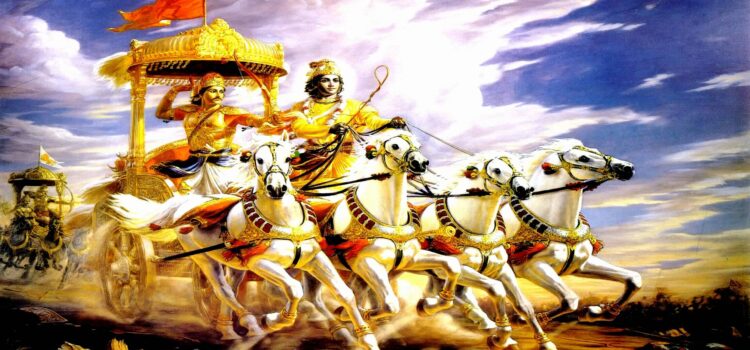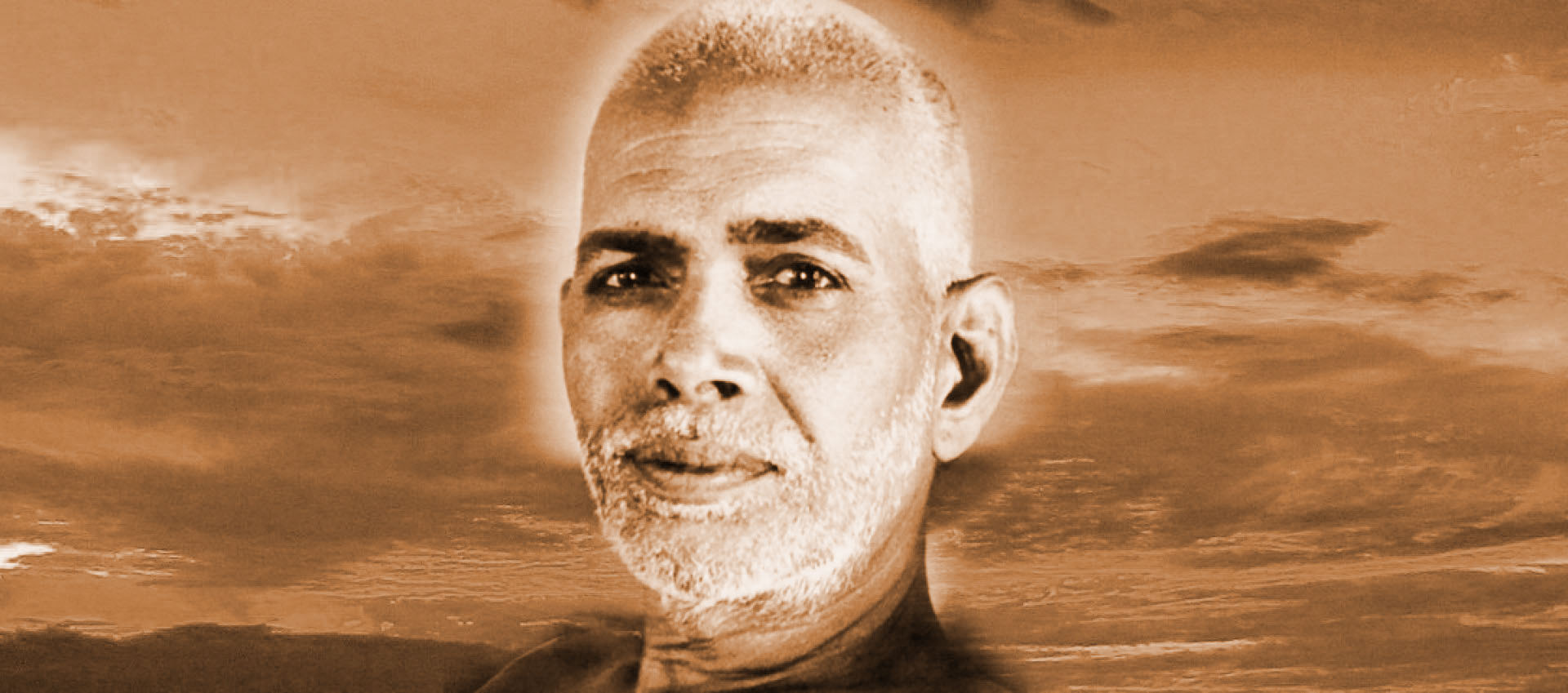
The Yoga of Action – Bhagavad Geeta – Chapter 3
1.
Arjuna Uvaacha:
Jyaayasee chet karmanaste mataa buddhir janaardana;
Tat kim karmani ghore maam niyojayasi keshava.
Arjuna said:
1. If You think that knowledge is superior to action, O Krishna,
why then do You ask me to engage in this terrible action, O Kesava?

2.
Vyaamishreneva vaakyena buddhim mohayaseeva me;
Tadekam vada nishchitya yena shreyo’ham aapnuyaam.
2.
With these apparently perplexing words you confuse my understanding;
therefore, tell me that one way by which I may attain bliss for certain.
3.
Sri Bhagavaan Uvaacha:
Loke’smin dwividhaa nishthaa puraa proktaa mayaanagha;
Jnaanayogena saankhyaanaam karmayogena yoginaam.
3.
The Lord said:
In this world there is a two-fold path, as I said before, O sinless one, – the path
of knowledge of the Sankhyas, and the path of action of the Yogis!
4.
Na karmanaam anaarambhaan naishkarmyam purusho’shnute;
Na cha sannyasanaad eva siddhim samadhigacchati.
4.
By the non-performance of actions man does not reach actionlessness,
nor by mere renunciation does he attain perfection.
5.
Na hi kashchit kshanamapi jaatu tishthatyakarmakrit;
Kaaryate hyavashah karma sarvah prakritijair gunaih.
5.
Indeed none can ever remain for even a moment without performing action;
for, everyone is made to act helplessly indeed by the qualities born of Nature.
6.
Karmendriyaani samyamya ya aaste manasaa smaran;
Indriyaarthaan vimoodhaatmaa mithyaachaarah sa uchyate.
6.
He who, restraining the organs of action, sits thinking of
the sense-objects in mind, he of deluded understanding, is called a hypocrite.
7.
Yastwindriyaani manasaa niyamyaarabhate’rjuna;
Karmendriyaih karmayogam asaktah sa vishishyate.
7.
But whoever, controlling the senses by the mind, engages himself in Karma
Yoga with the organs of action, without attachment, he excels O Arjuna.
8.
Niyatam kuru karma twam karma jyaayo hyakarmanah;
Shareerayaatraapi cha te na prasiddhyed akarmanah.
8.
Perform your bounden duty, for action is superior to inaction and even
the maintenance of the body would not be possible for you by inaction.
9.
Yajnaarthaat karmano’nyatra loko’yam karmabandhanah;
Tadartham karma kaunteya muktasangah samaachara.
9.
The world is bound by actions other than those performed
for the sake of sacrifice; therefore, O son of Kunti, perform action
for the sake of sacrifice, duty alone, free from attachment!
10.
Sahayajnaah prajaah srishtwaa purovaacha prajaapatih;
Anena prasavishyadhwam esha vo’stvishtakaamadhuk.
10.
The Creator, having in the beginning of creation created mankind
together with sacrifice, said: “By this you shall propagate; let this be the
milch cow of your desires (the cow which yields the desired objects)”.
11.
Devaan bhaavayataanena te devaa bhaavayantu vah;
Parasparam bhaavayantah shreyah param avaapsyatha.
11.
With this you nourish the gods, and may the gods nourish you;
thus nourishing one another, you shall attain to the highest good.
12.
Ishtaan bhogaan hi vo devaa daasyante yajnabhaavitaah;
Tair dattaan apradaayaibhyo yo bhungkte stena eva sah.
12.
The gods, nourished by the sacrifice, will give you the desired objects.
So, he who enjoys the objects given by the gods without offering
(in return) to them, is indeed a thief.
13.
Yajnashishtaashinah santo muchyante sarva kilbishaih;
Bhunjate te twagham paapaa ye pachantyaatma kaaranaat.
13.
The righteous, who eat out of the remnants of the sacrifice,
are freed from all sins; but those sinful ones who cook food
(only) for their own sake, indeed eat sin.
14.
Annaad bhavanti bhootaani parjanyaad anna sambhavah;
Yajnaad bhavati parjanyo yajnah karma samudbhavah.
14.
From food come forth beings, and from rain food is produced;
from sacrifice arises rain, and sacrifice is born of action.
15.
Karma brahmodbhavam viddhi brahmaakshara samudbhavam;
Tasmaat sarvagatam brahma nityam yajne pratishthitam.
15.
Know that action comes from Brahman, and Brahman proceeds from the
Imperishable. Therefore, the all-pervading Brahman ever rests in sacrifice.
16.
Evam pravartitam chakram naanuvartayateeha yah;
Aghaayur indriyaaraamo mogham paartha sa jeevati.
16.
He who does not follow the wheel thus set revolving, who is of sinful life,
rejoicing in the senses, he lives in vain, O Arjuna!
16.
Yastwaatmaratir eva syaad aatmatriptashcha maanavah;
Aatmanyeva cha santushtas tasya kaaryam na vidyate.
17.
But for that man who rejoices only in the Self, who is satisfied in the Self,
who is content in the Self alone, for him there is nothing to do.
18.
Naiva tasya kritenaartho naakriteneha kashchana;
Na chaasya sarvabhooteshu kashchidartha vyapaashrayah.
18.
For him there is no interest whatever in what is done or what is not done;
nor does he depend on any being for any object.
19.
Tasmaad asaktah satatam kaaryam karma samaachara;
Asakto hyaacharan karma param aapnoti poorushah.
19.
Therefore, without attachment, always perform action that should be done;
for by performing action without attachment, man reaches the Supreme.
20.
Karmanaiva hi samsiddhim aasthitaa janakaadayah;
Lokasangraham evaapi sampashyan kartum arhasi.
20.
Janaka and others attained perfection by action only; even with
a view of protecting the masses you should perform action.
21.
Yadyad aacharati shreshthas tattadevetaro janah;
Sa yat pramaanam kurute lokas tad anuvartate.
21.
Whatever a great man does, that other men also do;
whatever he sets up as the standard, that the world follows.
22.
Na me paarthaasti kartavyam trishu lokeshu kinchana;
Naanavaaptam avaaptavyam varta eva cha karmani.
22.
There is nothing in the three worlds, O Arjuna, that should
be done by Me, nor is there anything unattained that
should be attained; yet I engage Myself in action!
23. Yadi hyaham na varteyam jaatu karmanyatandritah;
Mama vartmaanuvartante manushyaah paartha sarvashah.
23. For, should I not ever engage Myself in action tirelessly,
men would in every way follow My path, O Arjuna!
24.
Utseedeyur ime lokaa na kuryaam karma ched aham;
Sankarasya cha kartaa syaam upahanyaam imaah prajaah.
24.
These worlds would perish if I did not perform action;
I should be the author of confusion of castes and destruction of these beings.
25.
Saktaah karmanyavidwaamso yathaa kurvanti bhaarata;
Kuryaad vidwaam stathaa saktash chikeershur lokasangraham.
25.
As the ignorant men act from attachment to action, O Bharata (Arjuna),
so should the wise act without attachment, wishing the welfare of the world!
26.
Na buddhibhedam janayed ajnaanaam karmasanginaam;
Joshayet sarva karmaani vidwaan yuktah samaacharan.
26.
Let no wise man unsettle the minds of ignorant people
who are attached to action; he should engage them in
all actions, himself fulfilling them with devotion.
27.
Prakriteh kriyamaanaani gunaih karmaani sarvashah;
Ahamkaaravimoodhaatmaa kartaaham iti manyate.
27. All actions are wrought in all cases by the qualities of Nature only.
He whose mind is deluded by egoism thinks: “I am the doer”.
28.
Tattwavittu mahaabaaho gunakarma vibhaagayoh;
Gunaa guneshu vartanta iti matwaa na sajjate.
28.
But he who knows the truth, O mighty-armed Arjuna, about the divisions
of the qualities and their functions, knowing that the Gunas as senses
move amidst the Gunas as the sense-objects, is not attached.
29.
Prakriter gunasammoodhaah sajjante gunakarmasu;
Taan akritsnavido mandaan kritsnavin na vichaalayet.
29.
Those deluded by the qualities of Nature are attached to the
functions of the qualities. A man of perfect knowledge should
not unsettle the foolish one of imperfect knowledge.
30.
Mayi sarvaani karmaani sannyasyaadhyaatma chetasaa;
Niraasheer nirmamo bhootwaa yudhyaswa vigatajwarah.
30.
Renouncing all actions in Me, with the mind centred in the Self,
free from hope and egoism, and from (mental) fever, fight.
31.
Ye me matam idam nityam anutishthanti maanavaah;
Shraddhaavanto’nasooyanto muchyante te’pi karmabhih.
31.
Those men who constantly practise this teaching of Mine with faith and
without cavilling and doubting, they too are freed from actions.
32.
Ye twetad abhyasooyanto naanutishthanti me matam;
Sarvajnaanavimoodhaam staan viddhi nashtaan achetasah.
32.
But those who carp at My teaching and do not practise it,
deluded in all knowledge and devoid of discrimination,
know them to be doomed to destruction.
33.
Sadrisham cheshtate swasyaah prakriter jnaanavaan api;
Prakritim yaanti bhootaani nigrahah kim karishyati.
33.
Even a wise man acts in accordance with his own nature;
beings will follow nature; what can restraint do?
34.
Indriyasyendriyasyaarthe raagadweshau vyavasthitau;
Tayor na vasham aagacchet tau hyasya paripanthinau.
34.
Attachment and aversion for the objects of the senses abide in
the senses; let none come under their sway, for they are his foes.
35.
Shreyaan swadharmo vigunah paradharmaat swanushthitaat;
Swadharme nidhanam shreyah paradharmo bhayaavahah.
35.
Better is one’s own duty, though devoid of merit,
than the duty of another well discharged. Better is death
in one’s own duty; the duty of another is fraught with fear.
36.
Arjuna Uvaacha:
Atha kena prayukto’yam paapam charati poorushah;
Anicchann api vaarshneya balaad iva niyojitah.
36.
Arjuna said:
But impelled by what does man commit sin, though against his
wishes constrained by force, Oh Varshneya (Krishna)?
37.
Sri Bhagavaan Uvaacha:
Kaama esha krodha esha rajoguna samudbhavah;
Mahaashano mahaapaapmaa viddhyenam iha vairinam.
37.
The Lord said:
It is desire, it is anger born of the quality of Rajas,
all-sinful and all-devouring; know this as the foe here (in this world).
38.
Dhoomenaavriyate vahnir yathaadarsho malena cha;
Yatholbenaavrito garbhas tathaa tenedam aavritam.
38.
As fire is enveloped by smoke, as a mirror by dust, and as an embryo
by the amnion (innermost membrane), so is this enveloped by that.
39.
Aavritam jnaanam etena jnaanino nityavairinaa;
Kaamaroopena kaunteya dushpoorenaanalena cha.
39.
O Arjuna, wisdom is enveloped by this constant enemy of the wise
in the form of desire, which is unappeasable as fire!
40.
Indriyaani mano buddhir asyaadhishthaanam uchyate;
Etair vimohayatyesha jnaanam aavritya dehinam.
40.
The senses, mind and intellect are said to be its seat;
through these it deludes the embodied by veiling his wisdom.
41.
Tasmaat twam indriyaanyaadau niyamya bharatarshabha;
Paapmaanam prajahi hyenam jnaana vijnaana naashanam.
41.
Therefore, O best of the Bharatas (Arjuna), controlling the senses first,
kill this sinful thing (desire), the destroyer of knowledge and realisation!
42.
Indriyaani paraanyaahur indriyebhyah param manah;
Manasastu paraa buddhir yo buddheh paratastu sah.
42.
They say that the senses are superior (to the body);
superior to the senses is the mind; superior to the mind is the intellect;
and one who is superior even to the intellect is He—the Self.
43.
Evam buddheh param buddhwaa samstabhyaatmaanam aatmanaa;
Jahi shatrum mahaabaaho kaamaroopam duraasadam.
43.
Thus, knowing Him who is superior to the intellect and restraining the self by the Self,
O mighty-armed Arjuna, slay the enemy in the form of desire, hard to conquer!
Hari Om Tat Sat
Iti Srimad Bhagavadgeetaasoopanishatsu Brahmavidyaayaam Yogashaastre
Sri Krishnaarjunasamvaade Karmayogo Naama Tritiyo’dhyaayah
Thus in the Upanishads of the glorious Bhagavad Gita, the science
of the Eternal, the scripture of Yoga, the dialogue between
Sri Krishna and Arjuna, ends the third discourse entitled: “The Yoga of Action”

